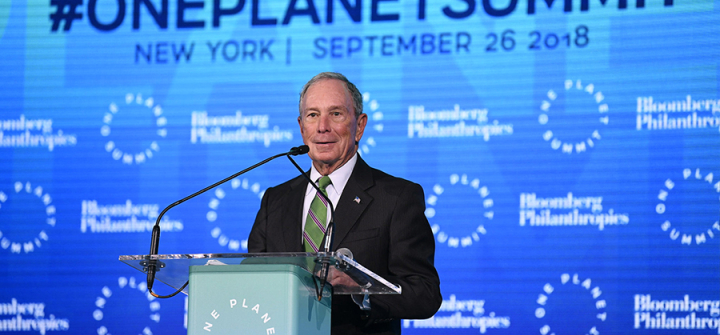Michael R. Bloomberg: Millions Don't Have to Die from NCDs
To the government leaders gathered in New York today for the third UN high-level meeting on noncommunicable diseases, Michael R. Bloomberg brings a positive message: The 41 million annual deaths from NCDs are largely preventable.
What’s needed to save millions of lives is political will.
Bloomberg, who is to be reappointed today to a second term as WHO’s Global Ambassador for Noncommunicable Diseases, backed effective strategies against NCDs as a 3-term mayor of New York City—leading to a 3-year increase in life expectancy for residents during his tenure. And as a philanthropist, Bloomberg has supported efforts to reduce the effects of tobacco, sugar-sweetened beverages, trans fats and other threats to health. (Bloomberg is a benefactor of the Johns Hopkins Bloomberg School of Public Health, which publishes Global Health NOW.)
In an exclusive Q&A with Global Health NOW conducted via email, Bloomberg shares his advice to national leaders at today’s UN high-level meeting, examples of best-buy interventions against NCDs, the value of solid data in allocating resources, and the under-appreciated power of cities to improve global health.
“Many of the most effective measures to fight NCDs don’t require a lot of money,” Bloomberg says. “They do require political will—and that’s something that today’s meeting at the UN can help to build.”
What will be your takeaway message today to the UN high-level meeting on NCDs?
We’re facing an epidemic—but we can do something about it. Noncommunicable diseases are largely preventable, and we know what works. National governments can save an awful lot of lives by putting the right measures in place, and their leadership can set an example for others.
What has most encouraged you and most discouraged you in the global fight against NCDs?
The progress we’ve made fighting tobacco use is very encouraging, because it is the number one agent of preventable death. Since 2007, Bloomberg Philanthropies has committed nearly $1 billion to combat tobacco use. When we started out, around 40 countries had at least one high-quality tobacco control policy in place. Today, 121 countries do. Over that period, global sales of cigarettes began falling for the first time since the beginning of the tobacco industry. Tobacco control measures adopted in the last 10 years will have saved nearly 35 million lives.
It’s also encouraging to see an increasing number of cities and countries pass taxes on sugary drinks. Obesity is a growing problem that will take an enormous toll on public health and the economy unless we act.
It’s disappointing that more countries and cities aren’t taking action yet—but we can’t let that discourage us.
You place a great emphasis on the ability of cities to improve health. Which cities offer the best examples of effective programs against NCDs?
Cities can be the engines of change beyond their borders. When policies work at a local level, national governments are more likely to adopt them. That’s the idea behind the “Partnership for Healthy Cities,” a program that our foundation is leading with WHO and Vital Strategies. We are working with mayors and local leaders around the world to improve public health through city policies. So far, we’ve recruited 54 cities in every region of the world.
Just to give you a few examples: Quito, Ecuador, is eliminating junk foods in schools. Shenzen, China, is banning e-cigarettes indoors. Accra, Ghana, transformed a dangerous major intersection in the heart of the city by implementing speed reduction measures, and their mayor is interested in doing more.
What’s your advice for leaders trying to advance public health interventions like increasing tobacco taxes or launching taxes on sugar-sweetened beverages? The evidence supports initiatives like these, but industry has the advantage of marshaling public opinion against tax increases.
The policies that initially encounter the most resistance often turn out to be the most popular. When we introduced a ban on indoor smoking in New York City, some people said tourists would stop visiting and that restaurants and bars would go out of business. The opposite happened: People came in record numbers and business in bars and restaurants boomed, because people want to go out to enjoy an evening without breathing in toxic air. Now, no one would want to reverse the ban. Special interests will always push back against policies that impact their bottom line, but the number one responsibility of government is to protect people’s well-being.
Bloomberg Philanthropies has invested $20 million in Stopping Tobacco Organizations and Products (STOP) as a global watchdog. What kinds of tobacco industry deceptions do you want to expose? What are your ideal outcomes for STOP?
The tobacco industry is working hard to get another generation of children hooked on their products—and we can’t let that happen. The STOP effort will look closely at the industry’s practices targeting children so that governments can increase their efforts to protect kids. It will also draw more attention to how the tobacco industry lobbies governments to influence policy. Tobacco companies should not have a seat at the table when it comes to negotiating policies pertaining to their products.
What are the best investments that low- and middle-income countries could make to reduce NCD deaths?
Raising taxes on tobacco products is the most effective way to save lives—but also the least widespread, in part because of opposition from the tobacco industry. We’re working with the WHO and other partners to encourage more countries to raise these taxes, which also generates revenue that countries can invest in public services, including health care. The same is true for taxes on sugary drinks.
There are other low-cost steps countries can take to save lives like more screening for cancer and high blood pressure, and reducing salt in packaged foods. Many of the most effective measures to fight NCDs don’t require a lot of money. They do require political will—and that’s something that today’s meeting at the UN can help to build.
We know that with increasing prosperity comes increases in risk factors for NCDs. How optimistic are you about changing the trend lines globally in heart disease, diabetes, cancer and other NCDs?
When I was growing up, polio was a fear for every family, and a reality for millions. Today, it is on the verge of being completely eradicated from the face of the earth. Smart public health policies made that possible, and they can help us make the same progress against NCDs as we have against communicable diseases. They already are. Think about this: In 1965, more than 40% of Americans smoked. Now around 15% do. That’s too many, but we’re making progress. So history gives us good reason to be optimistic. The challenge is learning from that progress, and moving forward globally even faster than we have in the past.
Recent reports have shown that Bangladesh has 3.5 million fewer tobacco users and India 8.1 million fewer tobacco users. What’s behind those advances and how can they be replicated globally?
Both countries have implemented some of the policies that are driving down tobacco use around the world. Bangladesh implemented a national smoke-free policy, banned tobacco advertising and created an effective campaign alerting people to the dangers of smoking.
India took some of those steps and is also requiring graphic health warnings that cover 85% of the front and back of tobacco packaging—one of the most stringent rules in world. It also enacted a novel measure requiring anti-tobacco messages to run prior to and during TV shows or films that depict tobacco use. It’s a great way to raise public awareness.
Bloomberg LLC was founded on organizing business data, and you have subsequently supported data-intensive efforts such as Data for Health. How will better data help reduce the impact of NCDs globally?
Without good data, governments don’t know where problems are, or where to direct their resources, or whether their efforts are making a difference. On smoking, we support the Global Adult Tobacco Survey, which measures how many people are using tobacco from country to country—which helps to show which policies are most effective. For example, in India, the survey showed that the majority of tobacco users were not smoking traditional cigarettes. They were chewing tobacco or smoking bidis. So, India rightly concentrates a lot of its efforts on those products.
Through the Data for Health program, we’re doing NCD surveys by cellphone, so that countries can more accurately track their progress in real time. Before, we were waiting 5 or 10 years to get this type of information. Now countries will be able to act faster—and that will save lives.
What drew you into the fight against NCDs?
Our foundation’s goal is to help the greatest number of people live longer, better lives. The fight against NCDs is one of the most powerful ways to do that. We also know from experience how much progress is possible. During our Administration’s time in office, New Yorkers’ life expectancy increased by 3 years. Many of the steps we took—such as passing the smoke-free air act, raising taxes on cigarettes, banning trans fats, and reducing air pollution—helped make that possible by reducing the number of people suffering or dying from NCDs.
The term “noncommunicable diseases” has been described as hard to understand. Is this a problem? Have any alternatives?
The more we do to raise awareness of these diseases, their causes, and their dangers, the more the term will be understood—and the more the need for action will be recognized. That’s why today’s meeting at the UN is so important.
Ed. Note: This is the latest installment of a series of Global Health NOW interviews with public health leaders.
Join the tens of thousands of subscribers in more than 100 countries who rely on Global Health NOW summaries and exclusive articles for the latest US and global public health news. Sign up for our free weekday enewsletter, and please share the link with friends and colleagues: http://www.globalhealthnow.org/subscribe.html
Michael R. Bloomberg at the One Planet Summit on September 26, 2018. (Image: Courtesy)





